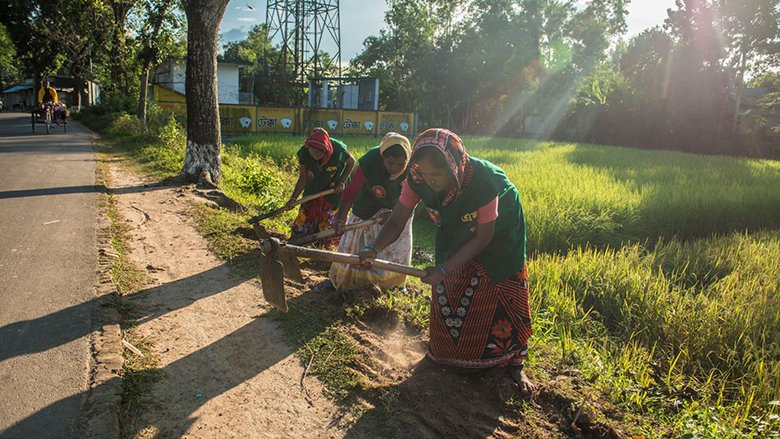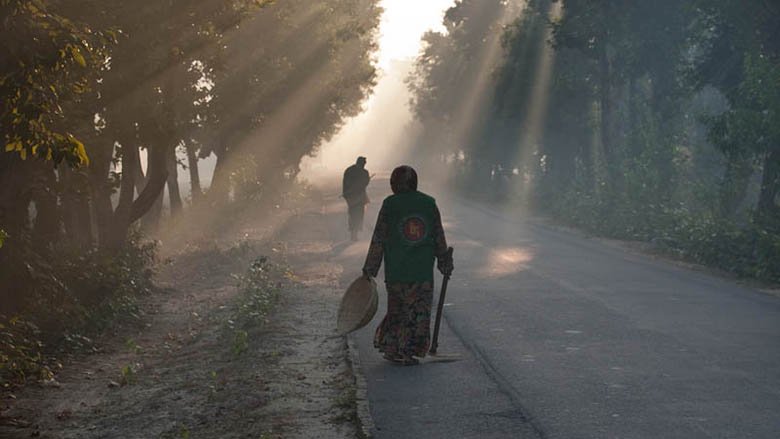Challenge
Women have a hard struggle finding opportunities in the Bangladesh workforce. In the transport sector, there is considerable scope to correct the gender imbalance and give vulnerable, poor women a chance to earn a livelihood. In rural road maintenance, for example, women make up only about 13 percent of the workers. Bangladesh also has big regional disparities in development levels and the country’s western areas are lagging behind in poverty reduction and other measures. The COVID-19 pandemic caused further job losses and put the livelihoods of the most vulnerable at great risk; its impact on women has been most severe in cases where they are dependent on the income of their husbands or of others.
Approach
The COVID-19 Relief and Recovery component of the WeCARE Phase-1 Road project focuses on generating employment opportunities and increasing female participation in the Transport sector labor force. It fosters jobs that create livelihoods through labor-intensive civil works such as routine maintenance of road and market infrastructures, with women organized in groups called Labor Contracting Societies (LCS).
The initiative also draws on the Bank’s GEMS platform, which provides a new technical solution for monitoring and continued transparency of work sites. Equipped with a mobile phone and a bicycle, LCS group supervisors upload geo-tagged photographs capturing the progress of works or proof of the presence of workers in the field. The GEMS platform allows reports to be registered in the portal once internet connectivity is available, minimizing the need for an internet connection at remote sites.
Results
These were the main results so far of the WeCARE Phase-1 Project, which provided livelihood support to vulnerable people in rural areas and acted as a stimulus to the local economy:
• 128,000 days of employment were created through labor contracting societies for intensive civil works by January 2022. Mainly vulnerable destitute women were recruited through a widely circulated recruitment process. To facilitate this process, the Bank helped the Local Government Engineering Department (LGED), one of the implementing agencies of the WeCARE Project, prepare a comprehensive guideline on LCS works. The contents ranged from defining the process of recruitment, the scope of the works, payments, tools to be used, Environment Health and Safety, and code of contact.
• 61 Supervisors and 728 crews, most of them poor women, were recruited under LCS activities. The number included a few ethnic minority people (Horizon community) who had previously been maintenance professionals but lost their jobs due to the pandemic.
• Mobile financial services were introduced to pay LCS workers, requiring the identification of each worker on the payroll individually. This avoided manual cash transfers and thus protected the workers from the risk of being underpaid.
• In parallel, the GEMS platform registered more than 6,500 reporting files by January 2022, ensuring supervision transparency and remote monitoring of works. A number of training sessions were organized by Bank Team to the implementing Agencies on GEMS.
Bank Group Contribution
The WeCARE phase 1 project was approved in June 2020 and is financed by the IDA Scale-Up financing window. The overall IDA contribution for Phase 1 is US$500 million, of which US$183 million is dedicated for LGED works. Among these, US$7.8 million is dedicated to job generation through labor-intensive civil work.
Partners
No other development partner is involved in the WeCARE Phase 1 project.
Moving Forward
The LCS works appear to be a promising way to generate employment in the transport sector labor force. In the future, the LCS workers will be supported by the Income Generation Activity (IGA) training. Participants will also be part of a mandatory savings scheme, so they will gain both skills and some capital, benefiting the local economy. Upcoming WeCARE phases will replicate the model in areas where economic recovery and livelihood support are needed by the rural population, especially in times of emergency.
Beneficiaries
Nina Khatun, one of the supervisors recruited under WeCARE for LCS works monitoring, said: “I was jobless for last one and half years. I had to pass a very hard time. WeCARE brings me job opportunities. I am extremely happy with my family. Such job not only created sustained income for me but also getting a better life now”.

